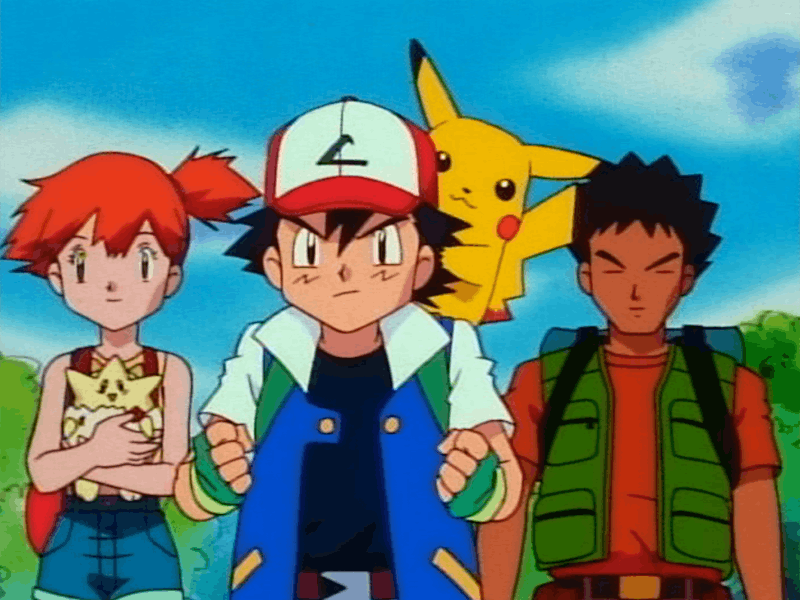The 'Pokemon' Cartoon Is Still Great, 20 Years Later
A sense of wonder through the eyes of youth make this '90s relic stay fresh.

Since its launch several weeks ago, [Pokémon Go] has been (https://www.inverse.com/article/18227-the-pokemon-go-updates-players-want), setting off Poké-mania once again. The augmented reality app from Nintendo and Niantic has brought the world of Pokémon back to the mainstream in a way it hasn’t been in 20 odd years, but its resurgence begs the question: Is it Pokémon that’s timeless, or is the craze merely the power of an addictive smartphone app?
If you’re nostalgic for a youth spent during the last Clinton presidency, the original Pokémon series holds up enough to make it worthy for a few binge marathons. After you’ve spent an afternoon around the block looking for Sandshrews, you can safely watch Pokémon knowing your nostalgia wasn’t all rose-colored glasses.
The first season, officially Pokémon: Indigo League, was chiefly directed by Kunihiko Yuyama and premiered in the U.S. on April 1, 1997. Lightly mimicking the plot from the video games Pokemon Red and Blue, a scrappy youngster named Ash Ketchum (voiced by Veronica Taylor) from the sleepy town of Pallet aspires to become a Pokémon master. On the one day when all 10 year-olds may begin formal training and competition, Ash oversleeps and is given the last Pokémon available: a rude, unfriendly Pikachu, an electric-powered mouse who does not take to Ash as his master. Reluctant companions at first, Ash gains Pikachu’s trust when he nearly sacrifices himself to save him, right on his first day.
The first episode in the series, “I Choose You!” sets up the ground rules of a world where legal animal dogfighting is a sport, science and an accepted way of life. It’s also entertaining and engaging with safe, non-offensive humor and heart that’s aged fine after 20 years. These hallmarks continued for the rest of its run, and while later episodes are a mixed bag — some great (“Island of the Great Pokemon”), some WTF (“The School of Hard Knocks”) — the series celebrates a Steven Spielberg-like sense of youth while exploring man’s relationship to nature and the importance of friendship.
Naturally, on his way to the top of the Indigo League, Ash catches more Pokémon — including all three starter Pokémon he missed because he snoozed — while also welcoming friends on his journey: Misty, a hot-tempered trainer specializing in water-types exiled from Cerulean City, and Brock, the former leader from Pewter City who wishes to breed Pokemon instead of training them for battle. It’s never explained how each Pokémon reproduce, thankfully for the better.
The young adventurers are stalked by Team Rocket, a renegade duo of thieves (and a Meowth who sounds like he learned speech from Goodfellas) seeking to steal Ash’s powerful, one-of-a-kind Pikachu. Team Rocket are regular antagonists for the series, especially in filler episodes, but in most cases these goons are quickly finished off in Road Runner fashion, lending them a function similar to Rosencrantz and Guildenstern for the show’s ongoing journeys.
The Spielberg elements — the strongest ingredient in Pokémon — shine brightest in Ash’s relationship to his pocket companions. Flip-flopping between cute and grating (Pokémon speech is limited to saying their species’s name), Pokémon serve as conduits for Ash to express the full range of emotions in a world dominated by global competition. Through the joy of victory, the agony of defeat, and the sacrifices in between, Ash becomes a winning protagonist despite his naivety and foolishness just because he’s so damn good to the Pokémon he meets (even if he forces them to fight). It inspires empathy and compassion in tiny, weak things, which pays off when these tiny things become beasts that can save you from danger and work to your benefit. Before Khaleesi, there was Ash Ketchum.
Pokémon never became brilliant like Avatar: The Last Airbender, and it never charms like a Looney Tunes short ever could. But that’s fine, as Pokémon remains in its own league as one of the first mainstream anime in the west (prior imports like Voltron and Dragon Ball Z did not create the pandemonium Pokémon did). I can’t speak for later seasons of Pokémon, during which new generations of Poke-specimens ran amok. But Pokémon: Indigo League is still a solid experience if the battle music conjures up any memories of a bygone Saturday morning.
Pokémon: Indigo League is now available to stream on Netflix.